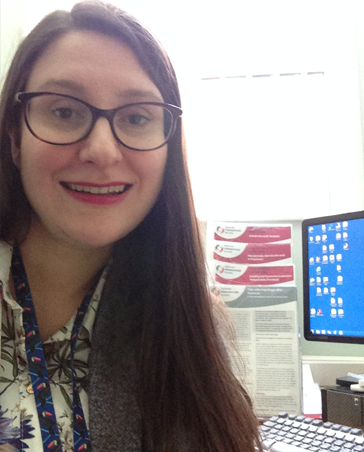Dr Kate Earp, Consultant Chemical Pathologist
Lots of people – including some doctors – aren’t aware of chemical pathology as a specialty, yet chemical pathologists, sometimes known as consultant clinical biochemists, play a vital role in supporting the diagnosis and monitoring of patients using blood tests. We speak to Consultant Chemical Pathologist Dr Kate Earp about why she loves her job and what it’s like to work a Metabolic Bone Department.

Tell us a bit about yourself and how you got to being where you are now.
I guess I always wanted to be a doctor. My parents bought me a book about the human body when I was younger and I loved it. At medical school I did a bit of reading about blood tests and how they are used in diagnoses – I found it very intriguing.
As an undergraduate and junior doctor I enjoyed all of my placements equally, so I wasn’t immediately sure what I would specialise in. It was my second year (F2) job in chemical pathology that was the deciding moment – it really fits with all the things I enjoy, like problem solving, and making diagnoses by detecting barely-there changes and anomalies.
From there I carried on with my medical training to become a registrar and recently became a consultant.
What does a chemical pathologist do?
Broadly speaking, chemical pathology concerns measuring anything that is a chemical in bodily fluids, but mainly in your blood. A medical chemical pathologist acts as a bridge between a lab and a blood test, and a patient and the workings of the hospital ward. Part of my role involves the specialist interpretation of blood test results in a clinical environment and the rest of the time I’m looking after patients with metabolic problems. As I specialise in bones, I support patients with bone disease, mainly osteoporosis.
What does a typical week involve?
A week is very varied. I have two outpatient clinics a week, which take up two and a bit afternoons. Outside of that, a lot of time is spent reporting on the results of DEXA scans (looking at bone density – a bit like an x-ray but for bone strength). I then put the DEXA scan analysis together with a review of the patient questionnaire to write up a report for their GP with suggestions of what treatment they might need.
During the week we have sessions discussing complicated cases with colleagues from other specialities. For example, we might talk to renal specialists to discuss the best possible treatment for someone with an underlying kidney problem. I take my turn on the duty biochemist rota, looking at a certain selection of unusual blood test results for doctors and helping them to interpret the results.
I also teach medical undergraduates, which involves lectures during term time and can involve short courses with small groups at the lab. I supervise students when we have them on the ward, too. A lot of universities don’t have teaching on chemical pathology, so this is quite unique to Sheffield.
When I was a registrar I worked full time, but I’ve now dropped down to four days a week, which I really enjoy. It’s easier to make this change in pathology than in some other medical professions.
What do you enjoy the most about your job?
I love talking to the patients, explaining the results to them and helping them to understand what the options are so that they can make the best decision about their treatment.
And what are the challenges you face in your job?
People aren’t really aware of chemical pathology as a specialty – so they don’t realise that they can call on us for help. For example doctors aren’t aware that we can help interpreting complicated results. The varied nature of the job can be a struggle too, you’re focussing on a lot of different things.
What advice would you give to students thinking about chemical pathology?
Contact your local department – there will be plenty of opportunities to get involved if you put yourself forward. You could ask about doing some work experience.
For undergraduates, I’d advise finding out if there is an option for chemical pathology placements. If there are no placements available then you could contact a chemical pathology department and ask if they need any help with running an audit. We’re a friendly, flexible and accommodating bunch so do approach us! And there’s also the Pathology Summer School run by the College to get involved with too.
What are some of the key skills you need to be a medical chemical pathologist?
Analytical skills – you need a good attention to detail and to enjoy problem solving. I’d say you need to be a reflective thinker – the decisions made in chemical pathology aren’t the high-pressure, time-scarce decisions that you might be demanded to make in A&E, but it’s important that the right conclusions are arrived at, which can take time.
Communication is another key skill – we are often required to explain complicated things in a simple and understandable way, not only to patients but also to other doctors from different specialties.
And you need to be inquisitive. Being a chemical pathologist is like being a detective in some ways – sometimes it’s not obvious what the problem is or what is wrong with a patient. There’s a real sense of achievement when you’ve solved the clues and successfully made a diagnosis – it’s a fascinating job.
